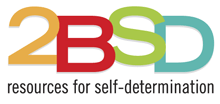www.selfdeterminationtheory.org
Self-determination theory (SDT), developed by Drs. Edward Deci and Richard Ryan of the University of Rochester, represents a broad framework for the study of human motivation and personality. SDT provides a highly important theoretical foundation to guide development of strategies to support and encourage self-determination. According to Deci and Ryan, “the interplay between the extrinsic forces acting on persons and the intrinsic motives and needs inherent in human nature is the territory of Self-Determination Theory.” Self-determination Theory asserts that “conditions supporting the individual’s experience of autonomy, competence, and relatedness foster the most volitional and high quality forms of motivation and engagement for activities, including enhanced performance, persistence, and creativity. In addition, SDT proposes that the degree to which any of these three psychological needs is unsupported or thwarted within a social context will have a robust detrimental impact on wellness in that setting.” Their website provides a wealth of resources addressing Self-Determination Theory and the research that supports it. The site also includes questionnaires that can be accessed at no cost and valuable information about conferences and networking opportunities.
http://www.ou.edu/education/centers-and-partnerships/zarrow.html
The Zarrow Center for Learning Enrichment (ZC) facilitates successful secondary and postsecondary educational, vocational and personal outcomes for students and adults with disabilities. ZC faculty, staff, and students do this through self-determination oriented evaluation, research, development, transition education instruction, and dissemination of best educational and support practices. The Zarrow Center also prepares undergraduate and graduate students to assume leadership roles in schools, universities, and support organizations. This site provides information about the work of the Zarrow Center and includes links to many resources including transition and self-determination assessment instruments and curricula. It also provides information on their latest product, the Transition Assessment and Goal Generator (TAGG), a new on-line transition assessment for secondary-aged youth with disabilities, their families, and professionals.
An increasing body of research has demonstrated the value of meditation practice to promote self-awareness and reduce stress, both of which support self-determination. The Center for Contemplative Mind in Society seeks to “transform higher education by supporting and encouraging the use of contemplative/introspective practices and perspectives to create active learning and research environments that look deeply into experience and meaning for all in service of a more just and compassionate society.” Their website includes both research articles about the use of contemplative practices in higher education as well as practical resources such as sample syllabi that incorporate contemplative practices into a wide variety of subject areas. The site also provides information on conferences and webinars.
http://community.cec.sped.org/dcdt/home/
The Council for Exceptional Children’s Division on Career Development and Transition is the premier organization advocating for the transition needs of children and youth with disabilities. They conduct policy analysis and advocate on behalf of resource allocation and legislation benefitting children and youth with disabilities with both state and federal governments. DCDT also sponsors regular conferences at national and local levels. These conferences provide a forum and an opportunity to learn about research and state-of-the-art practices for those interested in transition needs of children and youth with disabilities. On their website you can find information on valuable resources that can help students transition successfully from school to work and community.
The Center for Educational Improvement (CEI) is a nonprofit organization providing leadership in identifying, sharing, and applying 21st century innovations in learning in the areas of rigor in the classroom, neuroscience, science, technology, engineering and mathematics (STEM) and, their signature approach to social emotional learning focusing on compassion, courage, confidence, consciousness and community, Heart Centered Education. The organization offers professional development and conducts research on all of the areas of learning listed above. Their website also includes a free tool that includes several exercises educators can use in the classroom to help students learn how to reduce stress.
